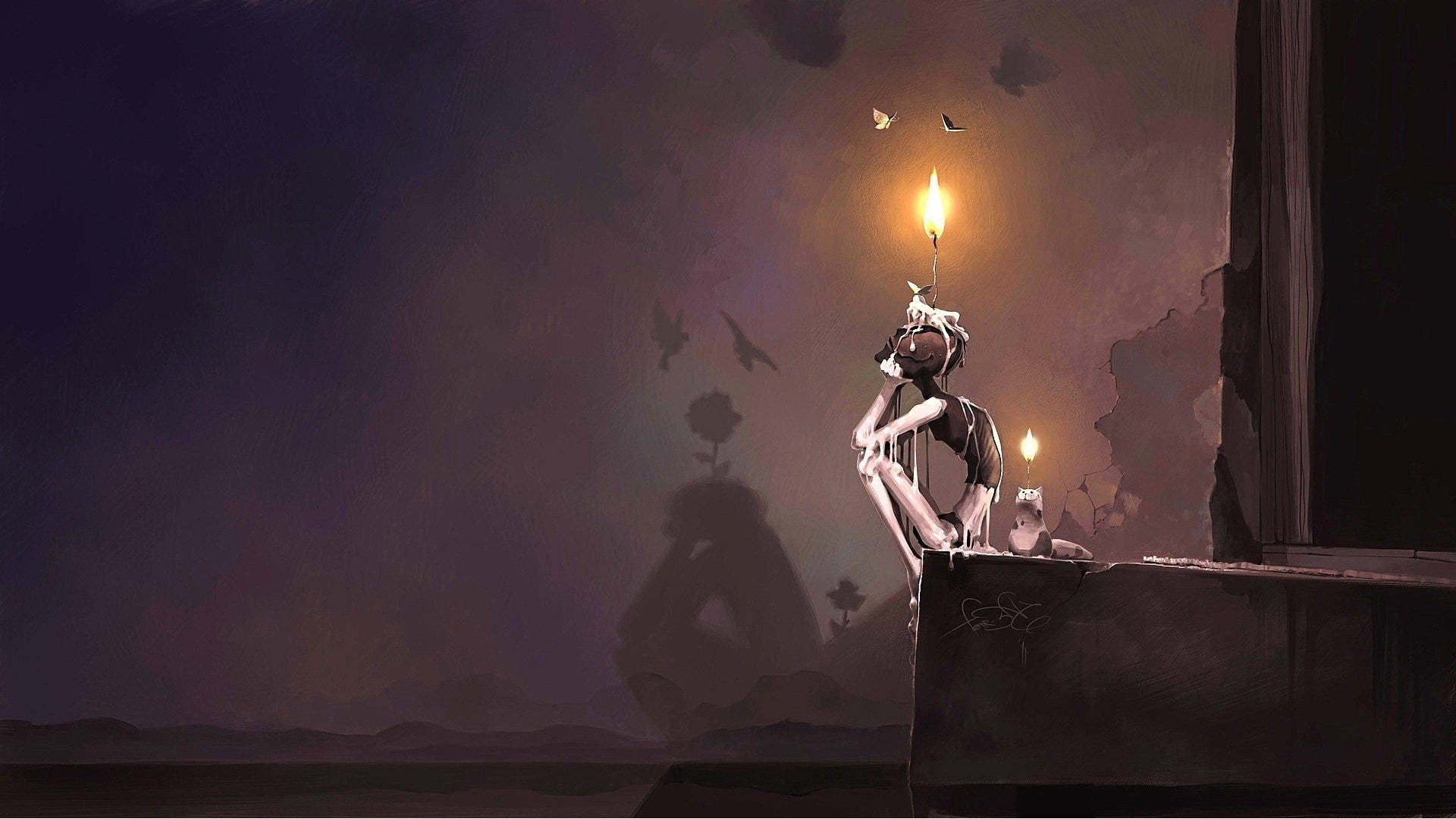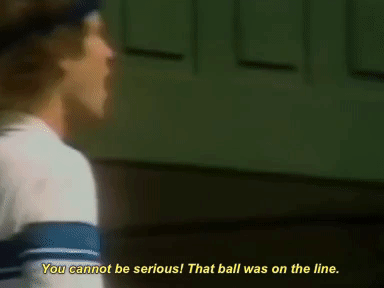
“Le jeu ne vaut pas la chandelle “ – Michel de Montaigne
The expression “the game is not worth the candle” began as a translation of a term used by French essayist Michel de Montaigne in 1580. At the time, a candle was a luxury item and any activity undertaken by candlelight incurred the cost of a physical candle.
If one were gambling, for example, the winnings would need to warrant the expense.
Ultimately, the expression related to occupations, games or activities that were thought so lacking in any merit that it wasn’t worth the expense of a candle to create enough light to partake in them.
Mental Tennis
“I felt that once I could break him, I could do it again” — Ivan Lendl.

Imagine you are in the final of the French Open and you are behind 3–6, 2–6 against an on-fire John McEnroe, who entered the final on a 39-match winning streak. McEnroe had won the first two sets in little more than an hour.
Ivan Lendl found himself in this scenario but bounced back narrowly in the third set to win 6–4.
Lendl was not out of jail yet, McEnroe broke Lendl’s serve in the fourth set and went up 4–2. Lendl came back to win that set 7–5 and in a memorable comeback won the French Open.
While McEnroe went on the win at Wimbledon and the US Open that year, this was a turning point in Lendl’s career. After this victory, Lendl had no problem winning the big matches and playing against McEnroe.
Lendl said, he knew if he could break McEnroe’s serve it would create momentum and enable him to win the match.
Momentous Moments and Monstrous Mountains to Climb
Now Imagine you are in the European Cup Rugby Final and you find yourself 22–6 down against a stomping Northampton at halftime. Your first half was packed with a slew of individual errors.
Many teams would capitulate (give in, yield, admit defeat, concede defeat, give up the struggle, submit, back down, give way, cave in, succumb, crumble).
Leinster (a rugby team in Ireland) did not capitulate and came back from 22–6 to win the European Championship in dramatic style.
Talking to several of the winning players they unanimously used the word momentum. Leinster Coach Joe Schmidt said if the team got even 3 points on the board, it would build momentum and momentum is a hard thing to stop.
Winning The Next Moment
The players galvanised over one simple goal. To score first was the only thing that mattered leaving the changing room, not winning the match but scoring first. In sport, this is known as winning the next moment or as Coach Joe Schmidt calls it “winning the moment in front of your face”.
Leinster rocketed into the second half to score a try within four minutes, this was the moment they had targeted. Winning that moment was the momentum team needed to win each moment thereafter.
BHAGS and Eating Elephants
“How do you eat an elephant?”, One bite at a time!” — Creighton Abrams
Author of ‘Good to Great’ Jim Collins refers to eating “The Elephant” as the Big Hairy Audacious Goal. This is essential in every business. This is the vision statement laid out by company leadership. By its very nature, it can be seen as questionable by some and therein lies the challenge.
If the goal is too Big, too Hairy and too audacious it can feel like trying to eat an elephant. When we feel like we are aiming for a BHAG we lose sight of smaller wins. When we persist to achieve an unattainable goal we are perpetually disappointed. Concordia University psychologist Carsten Wrosch says, “The disappointment of perpetual failure or shortfall leads to negative effects on biological processes in the endocrine, immune, metabolic, and central nervous systems” with consequences for the development of a long-term disease.
Thinking about this in a purely chemical way is helpful. Think of your to-do list. When you tick something off your to-do list you get a dopamine kick and instantly feel better. This is why we often do something then add it to our list purely to cross it off again = dopamine kick from achievement. (More on that here).
This is why celebrating the small wins becomes important. This is why identifying a moment to win, then winning it and then celebrating that win (even with a dopamine kick) is important, it builds momentum.
Business “Finals”
Finally, imagine coming into a business where the culture is dysfunctional, there is an air of entitlement and the business model is flawed. This is a situation so many CEOs face all the time. It is difficult enough to run an organisation to compete in a business environment of mass disruption, let alone have to fix the culture within the organisation.
This is where so many CEOs face the uphill struggle and ask themselves “Is the game worth the candle?”.
There is one key difference here between sports and business, the attitude of the people.
Focus on People
Many once-thriving companies are now struggling if they were thriving once, but not any longer it is almost always a people-related issue. We tend to look to the business models to fix businesses, while the key often lies in fixing the mental models.
One of the players in that victorious Leinster team said that a key to their turnaround was that they had a lot of leaders in the team, players who had captained various teams over the years and who had seen that a comeback was possible.
Many legacy organisations are packed with leaders. These leaders may need to be reinvigorated and may need to be reminded why they do what they do in the first place. Some may simply need to move on or be moved on and this may be the best for everyone involved.
“The systems down the hall trump the vision on the wall.” — Andy Stanley
The Benefit of Crisis
“When you have that window of opportunity called a crisis, move as quickly as you can, get as much done as you can. There’s a momentum for change that’s very compelling” — Anne M. Mulcahy
Innovation happens for one of a few reasons. One is gain, to grow the business, to succession plan for the next iteration of the product or service. The more common reason (and one that often happens much too late) is because of a burning platform such as a competitor, a new regulation or a failing business (model).
Most leaders are preoccupied with the business as it is today, this is what they are bonused on and incentivised towards. As this week’s guest on the innovation show Larry Osborne tells us “You cannot destroy the past when you are trying to create the future”.
Leaders need to initiate and manage both portfolios, but protect the future from the present and past (and in some cases vice versa).
As we hear ad nauseam it must start with a vision, but what we do not hear enough about is winning moments that matter. Winning smaller moments and celebrating those moments boosts morale, this leads to momentum and momentum inevitably leads to victory.
Start by doing what’s necessary; then do what’s possible; and suddenly you are doing the impossible — Unknown
IF YOU LIKE THURSDAY THOUGHT #100 PLEASE HIT A CLAP SO OTHERS SEE IT
This week’s innovation show is a must listen for: leaders, CEOs, innovators, intrapreneurs, change managers and business people.
With innovation, there’ll always be more failures than successful innovations. When it comes to our innovation efforts, we focus on the outlier; we turn a blind eye to the failures. We think we are different; we are sure our ideas will succeed.
Larry Osborne is Pastor of North Coast Church, acclaimed as one of the most influential and innovative churches in America. Larry is a sought-after innovation management consultant because turning around an organisation like a Church is recognised as a major achievement.
Larry shares a framework for change and some of the pitfalls we can avoid and some of the ideas we can embrace.
Have a listen:
Website http://bit.ly/2FwsOJw
Soundcloud https://lnkd.in/gBbTTuF
Spotify http://spoti.fi/2rXnAF4
iTunes https://apple.co/2gFvFbO
Tunein http://bit.ly/2rRwDad
iHeart Radio http://bit.ly/2E4fhfl
Subscribe by email http://bit.ly/2EWVlbj
You can find out more about Larry and his work here https://lnkd.in/e9XXXXG
#Innovation #transformation #leadership #culture #od #changemanagement #organisationaldevelopment